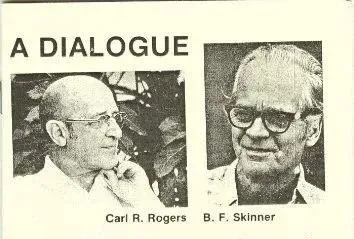早在1956年的心理學界,人本主義流派的領軍人物 卡爾·羅傑斯(Carl Rogers)和行為主義流派的領軍人物斯金納(B.F.Skinner)就有過這麽一個討論,刊登在了【科學】學術期刊上,以下是文章中卡爾·羅傑斯的發言的一部份內容的不嚴謹轉譯:

正如Meerloo和其他人所指出的,心理治療可以成為B控制A的最微妙的工具之一。治療師可以巧妙地塑造一個人,使他成為治療師的仿制品。他能致使一個人成為服從且順從的人。當某些治療原則以極端的方式使用時,我們稱之為洗腦。即「人格解體並按照控制者所希望的方式重新塑造」的例子。所以,治療原則可以被用作外界控制人類人格和行為的有效手段。不過,心理治療還能作為別的什麽手段使用嗎?
在這裏,我發現「以人為中心」的心理治療的發展是一個令人興奮的線索,它表明了「行為科學」能實作的事,實作我所說的[幫助人的]各種價值。「以人為中心」除了是心理治療的一個新方向之外,它也對「行為科學與人類行為控制的關系」有重要的意義。讓我描述一下我們的經驗,因為它與本次討論的問題有關。
在「以人為中心」的治療中,我們深深地參與了對行為的預測和影響,甚至是對行為的控制。作為治療師,我們建立了某些條件(治療師對來訪者的態度),而來訪者在建立這些條件方面的發言權相對較少。我們預測,如果這些條件被建立起來,來訪者的某些行為後果將隨之而來。到這個點為止,這主要是外界控制,與斯金納所描述的沒有區別,也與我在本文前面幾節所討論的沒有區別。但在這裏,任何相似性都不再存在。
我們選擇建立的條件預示著這樣的行為後果:來訪者將變得自我引導,不那麽僵化,更開放地對待他的感官所提供的證據,更好地組織和整合,更接近他為自己所選擇的理想形象。換句話說,我們透過外界控制建立了一些條件,並預測這些條件會激發一個人的追求內心目標的內在控制。
我們已經設定了預測各種行為類別的條件,包括:自我引導行為、對內在和外界現實的敏感性、靈活的適應力--這些行為在本質上是不可能被很具體地預測的。我們最近的研究表明,我們的預測在很大程度上得到了證實。而我們對科學方法的決心使我們相信,達成這些目標的更有效手段可能會兌現。
看到這段文字時,我得到了一些很寶貴的啟示。假如我的目的是創造一個自由自發的環境,那所謂「控制」的方法就能被允許。一切都是為了激發來訪者的自由選擇的權力,喚醒此人尊重自己的意誌。從這個角度上看,心理咨詢和教育方法就有很多共通之處,如果能因此激發這個人的內在動力和自我認可的行為,即便是「控制」又何嘗不可呢?
文中摘抄的英語原文:
Psychotherapy, as Meerloo (15) and others have pointed out, can be one of the most subtle tools for the control of A by B. The therapist can subtly mold individuals in imitation of himself. He can cause an individual to become a submissive and conforming being. When certain therapeutic principles are used in extreme fashion, we call it brainwashing. an instance of the disintegration of the personality and a reformulation of the person along lines desired by the controlling individual. So the principles of therapy can be used as an effective means of external control of human personality and behavior.Can psychotherapy be anything else?
Here I find the developments going on in client-centered psychotherapy (16) an exciting hint of what a behavioral science can do in achieving the kinds of values I have stated. Quite aside from being a somewhat new orientation in psychotherapy, this development has important implications regarding the relation of a behavioral science to the control of human behavior. Let me describe our experience as it relates to the issues of this discussion.
In client-centered therapy, we are deeply engaged in the prediction and influencing of behavior, or even the control of behavior. As therapists, we institute certain attitudinal conditions, and the client has relatively little voice in the establishment of these conditions. We predict that if these conditions are instituted, certain behavioral consequences will ensue in the client. Up to this point this is largely external control, no different from what Skinner has described, and no different from what I have discussed in the preceding ps of this article. But here any similarity ceases.
The conditions we have chosen to establish predict such behavioral consequences as these: that the client will become self-directing, less rigid, more open to the evidence of his senses, better organized and integrated, more similar to the ideal which he has chosen for himself. In other words, we have established by external control conditions which we predict will be followed by internal control by the individual, in pursuit of internally chosen goals. We have set the conditions which predict various classes of behaviors--self-directing behaviors, sensitivity to realities within and without, flexible adaptiveness--which are by their very nature unpredictable in their specifics. Our recent research indicates that our predictions are to a significant degree corroborated, and our commitment to the scientific method causes us to believe that more effective means of achieving these goals may be realized.
參考:此段落源於 卡爾·羅傑斯(Carl Rogers)和斯金納(B.F. Skinner 行為主義心理學的領軍人物)於1956年的辯論內容
Science, Nov.30, 1956, 124, pp.1057-1066










